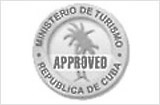CUBA'S HEALTH SYSTEM
Cuba’s health policies promote sustainable human development with the objectives of greater well-being and a higher quality of life, primarily in the areas of health, education, culture, employment, safety, and social welfare.
The National Health System is organized at three levels (national, provincial, and municipal), which mirror the country’s administrative structure.
The Cuban health system is financed by the State. The population receives free preventive, curative, and rehabilitation services, which range from primary care, routine medical attention, and dentistry to hospital care requiring the use of highly sophisticated medical technologies. In addition, all necessary diagnostic testing and drugs are provided free of charge to pregnant women and to persons receiving outpatient care in the context of certain programs.
Out-of-pocket expenditures for families include drugs prescribed for outpatient treatment, hearing aids, dental and orthopedic apparatuses, wheelchairs, crutches, and eyeglasses. The prices for all these items are low and are subsidized by the State.
Cuba's healthcare system is built on principles of free universal healthcare, accessible medical personnel, and a strong emphasis on preventive medicine. With an impressive doctor-to-citizen ratio of 84 doctors per 10,000 individuals, Cuba surpasses even wealthier nations like the United States, which has only 26 doctors per 10,000 people.
The National Health System comprises a network of institutions that are easily accessible and provide coverage to 100% of the population. In 2020 the system included 66,263 hospital beds (6.0 per 1,000 inhabitants) and 14,265 beds in social welfare institutions (1.3 beds per 1,000 inhabitants). Medical care is provided through a network made up of 281 hospitals, 11 research institutes, 442 polyclinics, and a contingent of family doctors practicing in workplaces and schools in the community.
In addition, there are 164 health posts, 209 maternity homes, 26 blood banks, and 4 health spas. Oral health care is provided in 168 dental clinics. Social welfare services include 190 homes for the elderly and 27 homes for disabled persons of different ages and with various types of impairment. The family doctor and nurse program serves 97% of the Cuban population.
Cuba's core health strategy is prevention. From promoting exercise, hygiene and regular check-ups, the system is geared towards averting illnesses and treating them before they become advanced and costly.
The reasons people die in Cuba tend to be the same as in high-income, developed, countries. The three leading causes of mortality are heart diseases, malignant neoplasms (cancer), and cerebrovascular and cardiovascular diseases, accounting for 58.9% of deaths.
In Cuba, HIV/AIDS transmission is considered low, with an estimated prevalence in 2004 of 0.05%. The benefits of the HIV/AIDS program, which includes triple antiviral therapy, are provided free-of-charge to all people living with the disease.
Protection of the population against 13 vaccine-preventable diseases has resulted in the eradication of polio, diphtheria, measles, whooping cough, rubella, and neonatal tetanus.
Cuba’s Successful Response to COVID-19
Introduction: In March 2020, when three Italian tourists tested positive for COVID-19, Cuba swiftly took action and implemented a series of strict measures. This included a nationwide lockdown, closure of borders, and other precautions to contain the spread of the virus. These proactive steps have positioned Cuba as a remarkable example of effective pandemic management, outperforming wealthier nations and even neighboring Caribbean countries.
Combating the Virus: Cuba's lockdown measures included the closure of schools and businesses, mandatory mask-wearing, and the isolation of COVID-19 positive patients. Notably, the closure of borders had a significant impact on Cuba's tourism industry, which is a vital source of foreign exchange for the country. Despite this, the strict measures played a key role in minimizing the virus's spread and protecting the Cuban population.
Comparative Success: When comparing COVID-19 cases and outcomes, Cuba's performance stands out. As of January 10, 2021, Cuba had recorded 14,576 cases and a total of 151 deaths (13 deaths per 1 million people). In contrast, Jamaica reported 312 deaths (105 deaths per 1 million people), and the Dominican Republic recorded 2,427 deaths (223 deaths per 1 million people) by the same date. Moreover, the United States had reached a staggering 1,151 deaths per 1 million people. These numbers highlight the exceptional management of the pandemic in Cuba, with credit given to its unique community-based medical system.
Community-Based Approach: Cuba's effective pandemic management can be attributed to its unique approach in delivering healthcare services. The local neighborhood, consisting of around 1,000 individuals, forms the foundation of the Cuban healthcare system. Each neighborhood is assigned a family physician and nurse, responsible for providing healthcare and conducting preventive health education within the community.
The Power of Accessibility: The accessibility of medical staff, information, and treatment has played a vital role in Cuba's ability to effectively manage the pandemic. The well-established neighborhood medical system and a systematic door-to-door medical survey known as Continuous Assessment and Risk Evaluation (CARE) have enabled swift identification and isolation of COVID-19 cases. Medical teams regularly visit households, discussing various health-related matters, including disease treatment, diet, and symptom canvassing during the pandemic.
Recognition and Lessons for the Future: Cuba's innovative healthcare model has gained recognition for its outstanding response to the pandemic. The Journal of the Royal Society of Medicine commended Cuba's health system, emphasizing its grounding in public health and primary care. Similarly, the Medicc Review highlighted the universal public health system as the backbone of Cuba's successful response to the Coronavirus pandemic.
The CARE model, implemented in Cuba, serves as an invaluable lesson for public health officials worldwide. This model not only effectively contained the spread of COVID-19 but also showcased the positive impact of preventative health measures and community medicine on enhancing the overall well-being of the population. In fact, Cuba's pandemic response received the highest evaluation on the Oxford Stringency Index in the spring of 2020.
Conclusion: Cuba's response to COVID-19 serves as a valuable case study, exemplifying the effectiveness of proactive measures, a robust healthcare system, and a community-based approach. The lessons learned from Cuba's success are significant and should be considered by public health officials globally to enhance their pandemic management strategies in the present and future. By adopting preventative health measures and prioritizing community medicine, countries can strive towards a healthier and more resilient population.
Cuba's investment in Biomedical Research
One of the most notable achievements of Cuba's biomedical research is its innovative work in vaccine development. In response to the pandemic, seven biomedical research facilities swiftly shifted their focus to develop COVID-19 vaccines and treatments. As a result, Cuba became the first Latin American country to have its own COVID-19 vaccine approved for clinical trials. The vaccine candidates, namely Soberana 2, Mambisa (CIGB-669), and Abdala (CIGB), demonstrated an impressive efficacy rate of over 90% in clinical trials and have subsequently received regulatory approval for emergency use. These vaccines now play a crucial role in Cuba's ongoing vaccination efforts, while two other vaccine candidates, Mambisa (CIGB) administered nasally and Soberana 01 (IFV), are currently undergoing clinical trials.
Cuba's Commitment to Medical Diplomacy
Cuba's commitment to medical diplomacy has also made it a global leader in providing healthcare assistance to countries in need. Since 2005, the Henry Reeve International Medical Brigade, comprised of more than 7,000 medical professionals, has been rapidly deployed to countries facing natural disasters or epidemics. This swift response team has garnered worldwide admiration and was even praised by former President Obama for their invaluable contributions. In recognition of these international efforts, Cuba was honored with the WHO Public Health Prize in 2017.
Throughout the COVID-19 pandemic, Cuba's global response has been extraordinary. Cuban medical teams were dispatched to Wuhan in January 2020, followed by the establishment and operation of a field hospital in Lombard, Italy, to treat COVID-19 patients. As the pandemic unfolded, Cuban teams extended their assistance to numerous countries across Latin America, the Caribbean, Africa, Asia, Europe, and the Middle East. Notably, Cuba showcased its humanitarian commitment by accepting the British cruise ship MS Braemar, which was denied entry by other countries due to COVID-19-infected passengers aboard. The British ambassador to Cuba and the British foreign secretary expressed their gratitude to Cuba for this remarkable act of solidarity.
Cuba's exceptional investment in biomedical research and its unwavering dedication to medical diplomacy have not only benefited its own healthcare system but have also made a significant impact globally. The country's innovative vaccine development and its timely response to COVID-19 outbreaks in numerous countries have been instrumental in saving lives and promoting international cooperation during these challenging times.
WHO health statistics for Cuba:
Life expectancy at birth m/f (years): 78.45 (2022)
Healthy life expectancy at birth m/f (years): 67.8
Under-five mortality rate (per 1000 live births): 5
Population: 11,194,449 (2023)
GDP per capita (US$): US $9,126 (2019)
Current health expenditure (% of GDP): 11 (2019)
US Cuba Legal Travel
In terms of visiting Cuba, legal travel from the USA has been all but impossible for over half a century.
Right now, however, a rare alteration in travel regulations made by former US President Barack Obama offers US citizens the opportunity to go to Cuba under the General License for Educational Activities, Support for the Cuban People, Professional Research, among others.
After the publication of the new updates to the Cuban Assets Control Regulations (31 CFR Part 515) on February 6, 2025, and July 14, 2025, all 12 categories of legal Cuba travel remain unaffected; except for the Individual People-to-people General License for Cuba travel which has been ended (the Group People-to-people General License) has been re-authorized though.
The future of travel from the US to Cuba is uncertain, and right now, US travelers still have the chance to go to Cuba legally for Professional Research, Support for the Cuban People, Professional Meetings, Religious Activities, and other venues.
Cuba Themed Tours
If you’ve got an idea of which style of trip will suit you best, take a look at our different trip themes below, as there’s something to suit everyone. Not only are there themed tours to fit any budget and interest, each Authentic Cuba Travel® experience immerses you in the authentic Cuba so hard to explore while just staying in full packed beach resorts.
Festival Tours
Our festival tours give travelers VIP access to all venues and happenings of Cuba’s famous international events such as the Havana Jazz Festival, Book Fair, Ballet Festival and others.
Study Tours
Through peer to peer interaction, our Cuba Study Tours® transcend ordinary tourism by immersing American students in the local culture, history, politics, music and contemporary arts.
Cultural Tours
Cuba Pathfinder® is your gateway to discover the unique Cuban cultural heritage, a set of traditions & memories not showcased in museums but much alive & thriving.
Architecture Tours
An architectural passage through Cuba’s best preserved colonial cities and unique architectural heritage, our architecture tours visit all UNESCO World Heritage Sites in Cuba.
Photography Tours
Capturing stirring pictures of authentic Cuban destinations it is not the only mission of our photography tours. Capture the essence of the Cuban culture and the kindness of its people.
Educational Tours
Our educational tours represents a great opportunity for K-12 teachers, university & college professors to explore Cuba’s education system while exploring colonial cities, towns and villages.
Nature Tours
An odyssey into Cuba's tropical paradise, our nature & bird watching tours gain access to the most pristine natural sites, from UNESCO Biosphere Reserves to National Parks.
Jewish Tours
A journey into the Jewish history in Cuba, our tours will strengthen the ties between Cuban Jewish communities and North American Jews. All while visiting 4 UNESCO World Heritage Sites!
Sports Tours
What sets our sports tours apart are the private exchanges with players, coaches & staff as well as sports journalists & personalities. Then you have best seats at the games!
CUBA TOUR FINDER
Select your authentic Cuba trip from over 70 Cuba tours in seconds. Sort by departure date, price, destination and even Cuba travel theme.
QUICK CUBA TOUR FINDERList of Cuba Tours 2026
-
Tour Name
Tour Dates
Cost
-
Cuba Al Natural
Havana, Zapata, Trinidad
Mar 7- Mar 18, 2026
$2,859 Book Now
-
Cuba Business Tour 1
Havana, Matanzas, Varadero
Mar 7- Mar 14, 2026
$2,599 Book Now
-
Healthcare Cuba Tour 1
Havana, Cienfuegos, Trinidad
Mar 7- Mar 14, 2026
$2,599 Book Now
-
Real Cuba Tour 3
Havana, Las Terrazas, Vinales
Mar 7- Mar 14, 2026
$2,599 Book Now
-
Cuba Engage Tour 3
Havana, Bay of Pigs, Trinidad
Mar 7- Mar 14, 2026
$2,599 Book Now
-
Cuba Art Explorer I
Havana, Vinales
Mar 7- Mar 14, 2026
$2,599 Book Now
-
Bird Watching Tour
Havana, Zapata, Trinidad
Mar 7- Mar 14, 2026
$2,599 Book Now
-
Cuba Education Tour 3
Havana, Cienfuegos, Trinidad
Mar 7- Mar 14, 2026
$2,599 Book Now
-
Cuba Education Tour 4
Havana, Vinales
Mar 14- Mar 21, 2026
$2,599 Book Now
-
Photography Tour I
Havana, Vinales, Trinidad
Apr 4- Apr 11, 2026
$2,629 Book Now
-
The Nature of Cuba
Havana, Vinales, Trinidad
Apr 4- Apr 13, 2026
$2,799 Book Now
-
Real Cuba Tour 4
Havana, Las Terrazas, Vinales
Apr 4- Apr 11, 2026
$2,599 Book Now
-
Cuba Engage Tour 4
Havana, Bay of Pigs, Trinidad
Apr 4- Apr 11, 2026
$2,599 Book Now
-
4 Biosphere Reserves
Rosario, Zapata, Buenavista
May 1- May 10, 2026
$2,999 Book Now
-
Real Cuba Tour 5
Havana, Las Terrazas, Vinales
May 9- May 16, 2026
$2,599 Book Now
-
Cuba Engage Tour 5
Havana, Bay of Pigs, Trinidad
May 9- May 16, 2026
$2,599 Book Now
-
Photography Tour II
Havana, Vinales, Trinidad
Jun 6- Jun 13, 2026
$2,629 Book Now
-
Cuba Art Explorer II
Havana, Cienfuegos, Trinidad
Jun 6- Jun 13, 2026
$2,599 Book Now
-
Cuba Education Tour 5
Havana, Cienfuegos, Trinidad
Jun 6- Jun 13, 2026
$2,599 Book Now
-
Real Cuba Tour 6
Havana, Las Terrazas, Vinales
Jun 6- Jun 13, 2026
$2,599 Book Now
-
Cuba Engage Tour 6
Havana, Bay of Pigs, Trinidad
Jun 6- Jun 13, 2026
$2,599 Book Now
-
Cuba Fire Festival
Havana, Santiago de Cuba
Jul 2- Jul 9, 2026
$2,799 Book Now
-
Real Cuba Tour 7
Havana, Las Terrazas, Vinales
Jul 4- Jul 11, 2026
$2,599 Book Now
-
Cuba Engage Tour 7
Havana, Bay of Pigs, Trinidad
Jul 4- Jul 11, 2026
$2,599 Book Now
-
Cuba Business Tour 2
Havana, Matanzas, Varadero
Jul 4- Jul 11, 2026
$2,599 Book Now
-
Healthcare Cuba Tour 2
Havana, Cienfuegos, Trinidad
Jul 4- Jul 11, 2026
$2,599 Book Now
-
Cuba Education Tour 6
Havana, Santiago de Cuba
Jul 4- Jul 11, 2026
$2,799 Book Now
-
Cuba Education Tour 7
Havana, Las Terrazas & Vinales
Jul 11- Jul 18, 2026
$2,599 Book Now
-
Jews of Cuba Travel
Havana, Santa Clara, Cienfuegos
Aug 6- Aug 13, 2026
$2,799 Book Now
-
Real Cuba Tour 8
Havana, Las Terrazas, Vinales
Aug 8- Aug 15, 2026
$2,599 Book Now
-
Cuba Engage Tour 8
Havana, Bay of Pigs, Trinidad
Aug 8- Aug 15, 2026
$2,599 Book Now
-
Photography Tour III
Havana, Vinales, Trinidad
Aug 8- Aug 15, 2026
$2,629 Book Now
-
Cuba Education Tour 8
Havana, Cienfuegos, Trinidad
Aug 8- Aug 15, 2026
$2,599 Book Now
-
Cuba Art Explorer III
Havana, Vinales
Aug 8- Aug 15, 2026
$2,599 Book Now
-
Cuba Legal Travel
Havana, Vinales
Aug 8- Aug 15, 2026
$2,799 Book Now
-
Cuba Architecture I
Havana, Cienfuegos, Trinidad
Aug 8- Aug 15, 2026
$2,599 Book Now
-
Seven Cities II
Havana, Santiago de Cuba
Aug 8- Aug 19, 2026
$3,329 Book Now
-
Real Cuba Tour 9
Havana, Las Terrazas, Vinales
Sep 5- Sep 12, 2026
$2,599 Book Now
-
Cuba Engage Tour 9
Havana, Bay of Pigs, Trinidad
Sep 5- Sep 12, 2026
$2,599 Book Now
-
Baseball Tour
Havana, Cienfuegos, Trinidad
Sep 5- Sep 12, 2026
$2,999 Book Now
-
African Heritage
Havana, Las Terrazas, Vinales
Oct 3- Oct 9, 2026
$2,699 Book Now
-
Real Cuba Tour 10
Havana, Las Terrazas, Vinales
Oct 3- Oct 10, 2026
$2,599 Book Now
-
Cuba Engage Tour 10
Havana, Bay of Pigs, Trinidad
Oct 3- Oct 10, 2026
$2,599 Book Now
-
Dance Cuba Tour
Havana, Las Terrazas
Oct 3- Oct 10, 2026
$2,599 Book Now
-
Performing Arts Tour
Havana, Cienfuegos, Trinidad
Oct 3- Oct 10, 2026
$2,599 Book Now
-
Cuba Ballet Festival
Havana, Vinales
Oct 31- Nov 7, 2026
$2,999 Book Now
-
Jo Jazz Havana
Havana, Las Terrazas, Vinales
Nov 4- Nov 11, 2026
$2,799 Book Now
-
Seven Cities I
Havana, Santiago de Cuba
Nov 5- Nov 16, 2026
$3,329 Book Now
-
Cuba Nature Tour
Havana, Vinales, Trinidad
Nov 6- Nov 15, 2026
$2,799 Book Now
-
Art & Fashion Festival
Havana, Cienfuegos, Trinidad
Nov 6- Nov 13, 2026
$2,699 Book Now
-
Real Cuba Tour 11
Havana, Las Terrazas, Vinales
Nov 7- Nov 14, 2026
$2,599 Book Now
-
Cuba Engage Tour 11
Havana, Bay of Pigs, Trinidad
Nov 7- Nov 14, 2026
$2,599 Book Now
-
Cuba Business Tour 3
Havana, Matanzas, Varadero
Nov 7- Nov 14, 2026
$2,599 Book Now
-
Healthcare Cuba Tour 3
Havana, Cienfuegos, Trinidad
Nov 7- Nov 14, 2026
$2,599 Book Now
-
Havana Film Festival
Havana, Vinales
Dec 7- Dec 14, 2026
$2,899 Book Now
-
Real Cuba Tour 12
Havana, Las Terrazas, Vinales
Dec 26- Jan 2, 2027
$2,799 Book Now
-
Cuba Engage Tour 12
Havana, Bay of Pigs, Trinidad
Dec 26- Jan 2, 2027
$2,799 Book Now
-
Cuba Education Tour 9
Havana, Cienfuegos, Trinidad
Dec 26- Jan 2, 2027
$2,599 Book Now
-
Cuba Education Tour 10
Havana, Bay of Pigs, Santa Clara
Dec 26- Jan 2, 2027
$2,599 Book Now
-
Cuba Education Tour 11
Havana, Santiago de Cuba
Dec 26- Jan 2, 2027
$2,799 Book Now
-
Bird Watching Tour
Havana, Zapata, Trinidad
Dec 26- Jan 2, 2027
$2,599 Book Now
-
Cuba Architecture II
Havana, Cienfuegos, Trinidad
Dec 26- Jan 2, 2027
$2,799 Book Now
-
Cuba Art Explorer IV
Havana, Las Terrazas
Dec 26- Jan 2, 2027
$2,799 Book Now
-
Photography Tour IV
Havana, Vinales, Trinidad
Dec 26- Jan 2, 2027
$2,729 Book Now
-
Jewish Heritage Tour
Havana, Cienfuegos, Trinidad
Dec 26- Jan 2, 2027
$2,899 Book Now
-
Family Discovery Tour
Havana, Cienfuegos, Trinidad
Dec 26- Jan 2, 2027
$2,699 Book Now
-
Real Cuba Tour 1
Havana, Las Terrazas, Vinales
Jan 9- Jan 16, 2027
$2,599 Book Now
-
Cuba Engage Tour 1
Havana, Bay of Pigs, Trinidad
Jan 9- Jan 16, 2027
$2,599 Book Now
-
Havana Art Biennial
Havana, Vinales
Dec 11- Dec 18, 2027
$2,799 Book Now
-
Cuba Jazz Festival
Havana, Cienfuegos, Trinidad
Jan 24- Feb 1, 2027
$3,099 Book Now
-
Santiago Jazz Festival
Santiago de Cuba
Jan 24- Jan 31, 2027
$2,899 Book Now
-
Havana Jazz Festival
Havana, Vinales
Jan 27- Feb 1, 2027
$2,499 Book Now
-
Havana Book Fair
Havana, Cienfuegos, Trinidad
Feb 12- Feb 19, 2027
$2,799 Book Now
-
Real Cuba Tour 2
Havana, Las Terrazas, Vinales
Feb 6- Feb 13, 2027
$2,599 Book Now
-
Cuba Engage Tour 2
Havana, Bay of Pigs, Trinidad
Feb 6- Feb 13, 2027
$2,599 Book Now
-
Habano Cigar Festival
Havana, Vinales
Feb 20- Feb 27, 2027
$8,999 Book Now
-
Cuba Education Tour 1
Havana, Cienfuegos, Trinidad
Feb 20- Feb 27, 2027
$2,599 Book Now
-
Cuba Education Tour 2
Havana, Cienfuegos, Trinidad
Feb 27- Mar 6, 2027
$2,599 Book Now
SUBSCRIBE
Sign up for email updates from Authentic Cuba Travel®. Our monthly newsletters are full of information on Cuba Study Tours®, Cuba Education Tours, Cuba Cultural Tours, Cuba Architecture Travel, Cuba Festival Travel, Cuba Nature & Bird Watching Travel & Sport Tours. Free Familiarization (FAM) Cuba Tours for educators. Get discounts from Authentic Cuba Travel®!
NewsletterMemberships & Affiliations
Bella Travel Group Ltd. (Federal Corporation number: 765324-7) owns and operates the following registered trademarks: Authentic Cuba Travel® is a trademark registered at the Canadian Intellectual Property Office (CIPO), Registration No. TMA975677 | Cuba Pathfinder® is a trademark registered at the Canadian Intellectual Property Office (CIPO), Registration No. TMA997988 | Cuba Pathfinder® is a trademark registered at the United States Patent and Trademark Office (USPTO), Registration No. 5498353 | Cuba Study Tours, Make Cuba Your Classroom® is a trademark registered at the United States Patent and Trademark Office (USPTO), Registration No. 5833051.

 1-877-280-2054 (North America)
1-877-280-2054 (North America) 647-351-8191
(Worldwide)
647-351-8191
(Worldwide)
 647-351-8191
(Worldwide)
647-351-8191
(Worldwide)
















